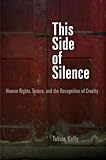This Side of Silence : Human Rights, Torture, and the Recognition of Cruelty / Tobias Kelly.
Material type: TextSeries: Pennsylvania Studies in Human RightsPublisher: Philadelphia : University of Pennsylvania Press, [2011]Copyright date: ©2012Description: 1 online resource (232 p.)Content type:
TextSeries: Pennsylvania Studies in Human RightsPublisher: Philadelphia : University of Pennsylvania Press, [2011]Copyright date: ©2012Description: 1 online resource (232 p.)Content type: - 9780812243734
- 9780812205237
- Human rights -- Great Britain
- Political prisoners -- Abuse of -- Great Britain
- Political prisoners -- Abuse of
- Political prisoners -- Legal status, laws, etc -- Great Britain
- Political prisoners -- Legal status, laws, etc
- Political prisoners -- Legal status, laws, etc. -- Great Britain
- Suffering -- Political aspects -- Great Britain
- Torture -- Moral and ethical aspects -- Great Britain
- Torture -- Moral and ethical aspects
- Human Rights
- POLITICAL SCIENCE / Human Rights
- Human Rights
- Law
- Political Science
- 364.6/7 23
- HV8599.G8 K45 2012eb
- online - DeGruyter
- Issued also in print.
| Item type | Current library | Call number | URL | Status | Notes | Barcode | |
|---|---|---|---|---|---|---|---|
 eBook
eBook
|
Biblioteca "Angelicum" Pont. Univ. S.Tommaso d'Aquino Nuvola online | online - DeGruyter (Browse shelf(Opens below)) | Online access | Not for loan (Accesso limitato) | Accesso per gli utenti autorizzati / Access for authorized users | (dgr)9780812205237 |
Frontmatter -- Contents -- Introduction -- Chapter 1. Talking about Torture after the Human Rights Revolution -- Chapter 2. The Legal Recognition of Torture Survivors -- Chapter 3. Clinical Evidence about Torture -- Chapter 4. Predicting the Future Risk of Torture -- Chapter 5. Prosecuting Torture -- Chapter 6. The Shame of Torture -- Conclusion -- Notes -- Bibliography -- Index -- Acknowledgments
restricted access online access with authorization star
http://purl.org/coar/access_right/c_16ec
We are accustomed to thinking of torture as the purposeful infliction of cruelty by public officials, and we assume that lawyers and clinicians are best placed to speak about its causes and effects. However, it has not always been so. The category of torture is a very specific way of thinking about violence, and our current understandings of the term are rooted in recent twentieth-century history. In This Side of Silence, social anthropologist Tobias Kelly argues that the tensions between post-Cold War armed conflict, human rights activism, medical notions of suffering, and concerns over immigration have produced a distinctively new way of thinking about torture, which is saturated with notions of law and trauma.This Side of Silence asks what forms of suffering and cruelty can be acknowledged when looking at the world through the narrow legal category of torture. The book focuses on the recent history of Britain but draws wider comparative conclusions, tracing attempts to recognize survivors and perpetrators across the fields of asylum, criminal law, international human rights, and military justice. In this thorough and eloquent ethnography, Kelly avoids treating the legal prohibition of torture as the inevitable product of progress and yet does not seek to dismiss the real differences it has made in concrete political struggles. Based on extensive archival research and ethnographic fieldwork, the book argues that the problem of recognition rests not in the inability of the survivor to communicate but in our inability to listen and take responsibility for the injustice before us.
Issued also in print.
Mode of access: Internet via World Wide Web.
In English.
Description based on online resource; title from PDF title page (publisher's Web site, viewed 24. Apr 2022)


